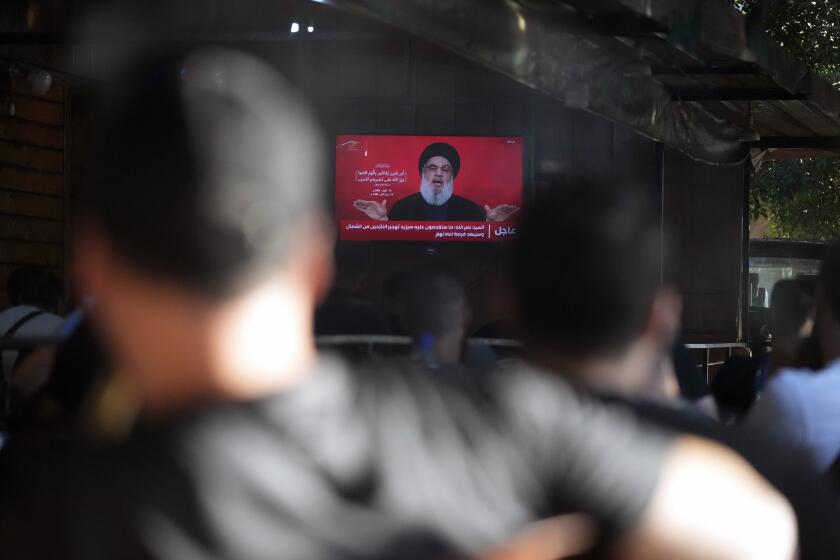Obama suffers big loss as trade bill is defeated at hands of Democrats
President Obama’s ambitious trade agenda unraveled Friday in a stunning setback delivered by his own party as the House rejected an important piece of a package aimed at fast-tracking a controversial trade pact he is pursuing with 11 other Pacific Rim nations.
Hoping to salvage what could be a key part of his legacy, Obama dashed to Capitol Hill before the vote Friday for a rare early morning meeting with Democrats. But amid fears that a trade deal would hurt American workers, even Obama’s dramatic personal intervention failed to generate the Democratic votes needed to bolster his unusual alliance with pro-trade Republicans.
The White House dismissed the vote as a “procedural snafu” and vowed to salvage the trade legislation when the House votes again next week.
But the unusual defeat at the hands of the increasingly defiant liberal wing of the Democratic Party was seen as a sign of Obama’s waning influence as he approaches his final two years in office.
“This is not about the president,” said Rep. Rosa DeLauro (D-Conn.), the liberal stalwart who led the opposition. “It really is all about what [lawmakers] heard from their own people, what they thought was the right thing to do.”
Trade is a major driver of California’s economy, so the ultimate outcome of the Pacific deal will affect many businesses and workers in the state. California is home to the nation’s busiest ports and a big exporter of electronics, farm products, machinery and many other goods and services — much of that going to Pacific Rim countries, including those involved in the negotiations.
The House vote Friday included two related measures, both of which had to pass in order to send the legislation — which was approved last month by the Senate — to the president’s desk.
A bill to give the president fast-track authority to negotiate future trade deals was approved by a 219-211 vote. But another measure regarding assistance funds to retrain workers — a program typically supported by Democrats — failed 126-302 largely because Democrats voted against it.
Because the Senate had previously approved both measures as a single bill, the House’s failure to pass the retraining measure prevented the overall package from advancing. Supporters plan to hold another vote on the retraining bill early next week, giving the White House and congressional Republicans another chance to drum up votes.
Obama’s push for the legislation was his biggest lobbying effort since the 2010 passage of the Affordable Care Act. He personally pressed fellow Democrats to support the measure in a meeting Friday morning on Capitol Hill and during an unscheduled appearance Thursday night at the annual congressional ballgame at the Nationals ballpark.
“Play it straight,” Obama told the House Democrats on Friday, urging them in a 20-minute private talk not to try to defeat the trade deal by voting against the worker retraining program. But his message seemed only to further divide the party and push liberal Democrats to dig in their opposition.
“Basically, the president tried to both guilt people and impugn their integrity,” said Rep. Pete DeFazio (D-Ore.). “There were a number of us who were insulted by the approach.”
Shortly before the vote, Minority Leader Nancy Pelosi (D-San Francisco), who was caught between supporting her members’ opposition to the trade deal and not wanting to embarrass a Democratic president, announced she was voting against the retraining bill as the only way to block the larger trade accord. At that point, the votes began peeling away in opposition.
Some Democrats said the White House lobbying effort was too little, too late.
“The shift from the White House and the president was not fast enough,” said Rep. Henry Cuellar (D-Texas), who supports the bills. “I wish there would have been much better outreach.”
It remains unclear if next week’s vote will bring any different result.
Republican leaders say they are unlikely to sway many more than the 86 GOP lawmakers who voted Friday in favor of the retraining assistance program. Most conservatives criticize the program as wasteful government spending, and Republicans don’t want their votes to be used against them in a primary challenge.
At the same time, Democrats remain split. Liberals appeared emboldened by their victory, though more moderate lawmakers were convinced their colleagues would come around to support the president. Only 40 Democrats voted for the retraining measure, and 90 more would need to join Republicans for passage.
In a statement after the vote, Obama called upon House members next week to approve the retraining measure.
“As I’ve said before, new trade agreements should go hand in hand with support to American workers who’ve been harmed by trade in the past,” Obama said. “I urge the House to pass [the retraining assistance program] without delay so that more middle-class workers can earn the chance to participate and succeed in our global economy.”
The legislation’s key component, however, is fast-track authority, which would give the Obama administration the ability to wrap up negotiations on the Trans-Pacific Partnership, a free-trade deal years in the making. Under fast-track, the president could present a final agreement to Congress for expedited consideration and an up-or-down vote with no amendments.
The Trans-Pacific Partnership would be one of the world’s largest and most ambitious trade efforts ever, aimed at removing barriers and establishing rules on investment and commerce affecting 40% of the global economy.
The Obama administration has held up the Pacific trade partnership as the economic centerpiece of its strategy to focus more on that fast-growing and increasingly wealthy region, arguing that the trade accord would be good for the American economy and ensure that the U.S., not China, writes the economic rules in Asia-Pacific.
The White House has argued that fast-track authority is vital to completing negotiations because officials in Japan and other partner countries will be reluctant to put their best offers on the table or make compromises unless they are assured the final package will stick.
Pursuit of the deal has aligned Obama with congressional Republicans, who are typically pro-free trade. But some GOP conservatives opposed the fast-track measure because they are loath to boost the president’s authority or help him win a legislative trophy.
“I understand a lot of our members don’t trust the president. Neither do I. That’s precisely why I support this bill,” Rep. Paul Ryan (R-Wis.), a chief negotiator, said Friday in the House, insisting the measure would give Congress additional oversight of the final trade deal. “TPA puts Congress in the driver’s seat.”
Democratic lawmakers, meanwhile, faced the uncomfortable choice of voting against their president or for a bill that at most has tepid support from ordinary constituents and is fiercely opposed by various consumer groups and organized labor. Union leaders, fearing a trade deal will send more American jobs overseas, have threatened to cut off election campaign help for lawmakers who support the measure.
Both sides were left stunned by Friday’s vote.
“Nobody in this body would have believed that we would have ended up where we ended up today,” said Rep. Steve Israel (D-New York), a member of the Democratic leadership.
“This is not how I expected the week to end,” agreed Rep. Patrick McHenry (R-N.C.), the chief deputy whip.
When fast-track authority faced obstacles in the Senate last month, GOP leaders won over some Democrats by coupling it with extended funding for retraining American workers hurt by foreign competition, a program known as Trade Adjustment Assistance.
But in the House, Democrats balked at the plan to pay for worker training with what they viewed as cuts to Medicare. After negotiations this week between Pelosi and Speaker John A. Boehner (R-Ohio), House GOP leaders split the measure into two bills, one for fast-track and another for the retraining funds. They also agreed to find an alternative funding source for the retraining program.
In a signal that every vote would be needed, Boehner, who by tradition as speaker does not typically vote, announced Friday he would back both bills.
But Republican skepticism about the retraining program gave Democrats greater leverage in defeating that portion of the package.
Brushing aside White House warnings that the GOP-controlled Congress would allow the retraining program to expire in September, House Democrats seized on what they saw as a tactical opening to defeat the larger trade package by rallying votes against the training-assistance program.
Times staff writer Christi Parsons in Washington, D.C., contributed to this report.
ALSO IN POLITICS:
Jeb Bush makes it through Europe unscathed, if not more popular at home
Bowing to reality, Iowa Republicans kill their straw poll
Hillary Clinton is going to try to change how voters see her
More to Read
Sign up for Essential California
The most important California stories and recommendations in your inbox every morning.
You may occasionally receive promotional content from the Los Angeles Times.











